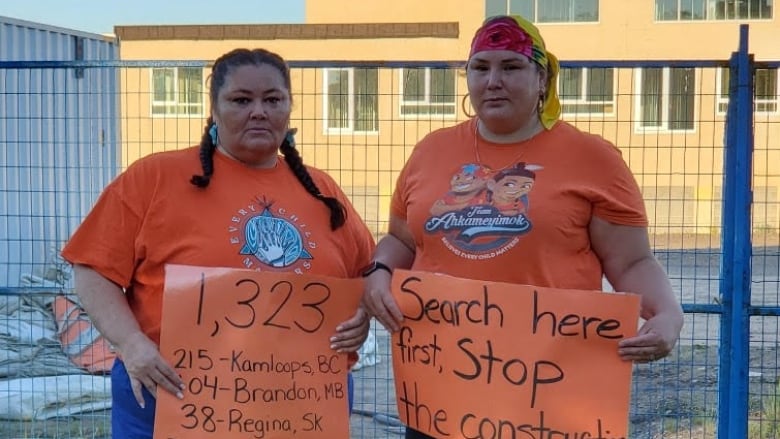Summerlong gatherings for awareness of Indigenous unmarked graves to wrap up this weekend
Advocates gathered at the former Camsell hospital site and two Enoch burial grounds

It was only supposed to be one day in June.
Two friends, overcome by sadness about discoveries of unmarked graves at former residential school sites, staged a protest at the site of Edmonton's former Charles Camsell Hospital.
Andrea Jenkins and Lorelei Mullings wanted people to know there could be unmarked graves at the site, which was once home to a segregated hospital for Indigenous people.
People stopped by, and some of them offered to join. By summer's end, dozens of people had spent 75 days on the awareness campaign, in three locations where elders believe people are buried.
"People just kept coming, and saying, you know, I could do another week. And it just snowballed into this," Jenkins said.
With autumn's approach, those outdoor protests will reach an end this week.
Supporters will gather Saturday and Sunday afternoon at an Enoch Cree Nation burial ground in Glastonbury.
On Thursday, for Orange Shirt Day, they will reconvene at 11 a.m., laying flowers at the three burial sites and praying for the people who never came home from residential schools or the Camsell Hospital.
"We've achieved quite a bit in doing this," Jenkins said. "Some of these people who've stopped by, who weren't familiar with residential schools or even the Indian hospitals, left with a new awareness and a new understanding of why Indigenous people deal with some of the things they have to deal with, to this day."
Jenkins is Métis. Her mother, grandmother, uncle and other relatives attended residential school in the Northwest Territories. She heard stories from her mother, and overheard her family talking about it. Her grandmother's experience was so awful, she never would.
They had no voice as children, Jenkins says, and so she is using hers.
A place to talk
The National Centre for Truth and Reconciliation estimates more than 4,000 children died in residential schools based on records, but has said the total could be much higher. The Truth and Reconciliation Commission heard survivors share stories of physical, emotional and sexual abuse at the schools.
Some sick adults and children from Alberta and the north who were taken to the Camsell hospital were buried in unmarked graves when they died. Ninety-four of them are memorialized on a cairn in a St. Albert cemetery. Elders say others burials remain unmarked.
The hospital is one of 29 named in a class-action lawsuit, in which survivors allege patients were abused, forcibly sterilized and experimented on without permission.
On June 24, the Cowessess First Nation in southern Saskatchewan announced a preliminary ground-penetrating radar search had identified what appears to be 751 unmarked graves at a former residential school site.
That spurred Jenkins and her friend Mullings into action.
Over many summer days, they've hosted drummers and singers, held traditional ceremonies, erected a teepee near Winterburn Road, and talked— to people who were naive about what happened and to people who need to talk about what happened.
"I've had people come up to us and apologize and say they had no idea," said Mullings, who is from the Enoch Cree Nation. "And come crying. And I'm like, 'It's OK, you know?' This is what we want to do, is just reach out to others."
She hopes it also dispelled some prejudices about Indigenous people, one conversation at a time.
"I would love people to look at us not one sided," she said. "To understand that we all have a story."
Supporters will be at the unmarked burial grounds at the east end of Garnett Point from 1 p.m. to 6 p.m. Saturday and Sunday. They plan to stay active online in the Free Our Indigenous Children Facebook group.

